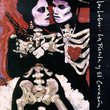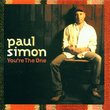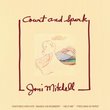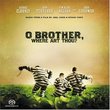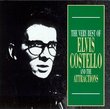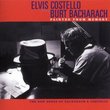| All Artists: Joni Mitchell Title: Turbulent Indigo Members Wishing: 0 Total Copies: 0 Label: Warner Bros / Wea Original Release Date: 10/25/1994 Release Date: 10/25/1994 Genres: Folk, Pop, Rock Styles: Singer-Songwriters, Vocal Pop, Folk Rock Number of Discs: 1 SwapaCD Credits: 1 UPCs: 093624578628, 936245786280 |
Search - Joni Mitchell :: Turbulent Indigo
 | Joni Mitchell Turbulent Indigo Genres: Folk, Pop, Rock
The 1996 Grammy winner for best pop album, Joni Mitchell's Turbulent Indigo is the singer's most distinctive and rewarding work since Wild Things Run Fast in 1982. Coproduced by Mitchell and her longtime collaborator and ... more » |
Larger Image |
CD DetailsSynopsis
Amazon.com The 1996 Grammy winner for best pop album, Joni Mitchell's Turbulent Indigo is the singer's most distinctive and rewarding work since Wild Things Run Fast in 1982. Coproduced by Mitchell and her longtime collaborator and former husband Larry Klein, Turbulent Indigo is perhaps the only one of her '80s and '90s discs on which she isn't unduly hampered by studio technology. Whereas her rotten taste in synthesizers lent an automatically dated sound to 1988's Chalk Mark in a Rain Storm and 1998's Taming the Tiger, here the gadgetry is unobtrusive and enhances the power of Mitchell's voice and guitar playing. It also helps that this batch of songs is particularly evocative and well written, ranging from the graceful "How Do You Stop," on which she wonders how to stop "love from slipping away," to the wonderful vignette "Yvette in English," which describes a chance encounter between Picasso and a reluctant model. Paintings and painters are obviously a major theme on the disc--the cover is Mitchell's portrait of herself in the guise of Van Gogh--but more striking is her pessimistic view of humanity. "The Magdalene Laundries" describes the fate of girls left pregnant and abandoned in convent laundry rooms, "Not to Blame" details "the miseries made of love" for all the world's battered wives, and the title of "Sex Kills" is entirely self-explanatory. "The Sire of Sorrow (Job's Sad Song)," the album's finale, is nothing less than the cries of the much-put-upon Job against a heartless God who makes "everything I dread and everything I fear come true." The plaintive beauty of the music helps sweeten the potential sourness of Mitchell's lyrics. Indeed, the contrast gives great force to Turbulent Indigo and confirms that Mitchell's intellectual prowess and willfully contrary outlook are two qualities sorely missing in the work of many of the contemporary songwriters who cite her as their godhead. --Jason Anderson Similar CDs
Similarly Requested CDs
|
CD ReviewsFiercely Beautiful M. Anderson | 12/30/1999 (5 out of 5 stars) "Blazing intelligence and talent that will light our culture long after Britney Spears is running a souvenir shop in Las Vegas." Painfully poetic Donn Hart | Boston | 07/14/2000 (5 out of 5 stars) "Each time I give "Turbulent Indigo" a spin I am consistently amazed at how dark and depressing the lyrics are, and yet, the sheer, pure beauty of the music doesn't exactly make this an album to slit your wrists by. Take "The Sire of Sorrow," for example. It has a repugnant lyrical theme of a man whose livelihood has been taken away by some unnamed "tireless watcher," presumably God. But at the same time, that amazing guitar work, arm in arm with Joni harmonizing with herself, make you simply want to sing along, and half the time, you don't even think about the depressing quality of the lyrics.The same holds true for basically every song on the record. "Not to Blame" is about a famous man (could it be O.J. Simpson?) who beat his wife to death, but everyone just said "She was out of line, you're not to blame," and Joni questions why, saying "Not one wet eye around her lonely little grave said 'He was out of line girl, you are not to blame.'" Again, repugnant theme said in a beautiful way with a fantastic arrangement.Other album highpoints: "Borderline," "Yvette in English," "Sex Kills," and "The Magdalene Laundries," about nasty people who hide behind masks of morality (remind you of any government types who happen to be ordained churchpeople, hmm?).To sum up, among her nineties recordings, I'd rank this one pretty high up there, and it's easily, IMHO, one of her top 5 best albums ever. It's worth your money, you can trust me on this one." Joni at her turbulent best.... M. Anderson | 09/23/1999 (5 out of 5 stars) "After a few lesser (but above average) albums Joni is back on song with an album which often achieves the kind of serene musical heights of "Blue", "For The Roses" and "Hejira". Joni the singer songwriter is again shining through rather than hiding behind a band. Wayne Shorter, Greg Leisz and Co all complement her songs perfectly but Joni is the focus - those great guitar chords, off beat rhythms and expressive voice. The lyrics are a bit moralistic at times but always interesting or provocative - "Not to Blame" for instance. "Where Do You Stop" - a duet with Seal is an excellent single but the classic songs are "Turbulent Indigo", "Magdalen Laundry", "Yvette in English" and the amazing "Sire of Sorrow". A memorable musical experience from our greatest living songwriter."
|

 Track Listings (10) - Disc #1
Track Listings (10) - Disc #1


